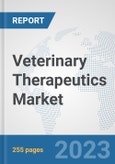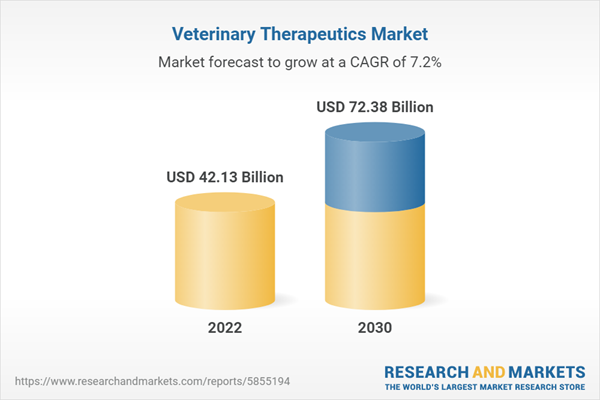The veterinary therapeutics market is growing due to the increasing growth of a variety of disease-causing bacteria and viruses in animals. Veterinary drugs have established their importance as an effective solution to treat several diseases which are caused by various reasons in animals. Veterinary drugs are basically developed in order to lower and control the attack of harmful viruses in animals. Thus, increasing infections and diseases in an animal is boosting the growth of the market. Moreover, the launch of affordable and effective drugs for treatments and rising spending on animal health in developing regions is also expected to drive the global veterinary therapeutics market during the forecast period. In addition, favorable government policies in developed economies are anticipated to provide growth to the market. Furthermore, rising research and development activities in the field of veterinary therapeutics in order for cost-effective and safe drug development are providing a lucrative opportunity for the growth of the market.
Companion animals are basically those animals who live in homes, owing to the feeling they provide as they are a part of the family, and these animals enjoy more legal protections than other animals. According to the 2021-2022 National Pet Owners Survey in the USA, 70% of households in the U.S. have at least one companion animal. Pets provide love and affection, also companion pets even help to keep good health. People feel that companion animal helps to lower blood pressure, reduce stress, and reduce heart-related diseases. Companion animals make people happier and healthier and many people are adopting these animals which helps to propel the growth of the segment. Moreover, the soaring benefits of owning a companion animal like greater compatibility between humans, lesser feelings of loneliness, and lesser allergies caused by animals are boosting the growth of this segment in developing regions and also contributing to the growth of the market.
North America owns the largest share of the veterinary therapeutics market and it is projected to continue its dominance owing to the presence of countries like the U.S., and Canada. The high presence of pet owners combined with high awareness among the people about animal health is propelling the growth of the market in the region. The increasing growth of the market in the North America region is also driven by the availability of established, superior, and quality healthcare services. It is a developed region, with a strong economic base, along with this increasing per capita income and disposable income is also boosting the market growth. On the other hand, Europe owns the second-largest share of the market in terms of revenue. UK and Germany significantly contributed to the regional growth owing to the high availability of cost-effective and advanced veterinary drug solutions. Moreover, Asia Pacific is anticipated as the fastest-growing region for the veterinary therapeutics market over the forecast period. Rising initiatives by NGOs, and different private organizations towards animal healthcare, combined with increasing adoption of medicated feed additives for livestock companions are contributing to the growth of the market in the Asia Pacific region.
Report Findings
1) Drivers
- The rising numerous diseases among animals across the globe is driving the growth of the market.
- Increase in ownership of animals boosting the growth of the veterinary therapeutics market.
2) Restraints
- Less awareness among people regarding animal health is hampering the growth of the market.
3) Opportunities
- The increasing research and development activities in the field of veterinary therapeutics for effective drug development are providing a lucrative opportunity for the growth of the market.
Research Methodology
A) Primary Research
The primary research involves extensive interviews and analysis of the opinions provided by the primary respondents. The primary research starts with identifying and approaching the primary respondents, the primary respondents are approached include1. Key Opinion Leaders
2. Internal and External subject matter experts
3. Professionals and participants from the industry
The primary research respondents typically include
1. Executives working with leading companies in the market under review2. Product/brand/marketing managers
3. CXO level executives
4. Regional/zonal/country managers
5. Vice President level executives.
B) Secondary Research
Secondary research involves extensive exploring through the secondary sources of information available in both the public domain and paid sources. Each research study is based on over 500 hours of secondary research accompanied by primary research. The information obtained through the secondary sources is validated through the crosscheck on various data sources.The secondary sources of the data typically include
1. Company reports and publications2. Government/institutional publications
3. Trade and associations journals
4. Databases such as WTO, OECD, World Bank, and among others.
5. Websites and publications by research agencies
Segment Covered
The global veterinary therapeutics market is segmented on the basis of product type, animal type, and route of administration.The Global Veterinary Therapeutics Market by Product Type
- Drugs
- Vaccines
- Medicated Feed Additives
The Global Veterinary Therapeutics Market by Animal Type
- Companion Animal
- Livestock Animal
The Global Veterinary Therapeutics Market by Route of Administration
- Oral
- Parenteral
- Topical
Company Profiles
The companies covered in the report include- Boehringer Ingelheim
- Bayer AG
- Dechra Pharmaceuticals
- Ceva Santé Animale
- Elanco
- Merck Animal Health
- Virbac
- Merial (acquired by Boehringer Ingelheim)
- Zoetis Services LLC
- Vetoquinol
What does this Report Deliver?
1. Comprehensive analysis of the global as well as regional markets of the veterinary therapeutics market.2. Complete coverage of all the segments in the veterinary therapeutics market to analyze the trends, developments in the global market and forecast of market size up to 2030.
3. Comprehensive analysis of the companies operating in the global veterinary therapeutics market. The company profile includes analysis of product portfolio, revenue, SWOT analysis and latest developments of the company.
4. Growth Matrix presents an analysis of the product segments and geographies that market players should focus to invest, consolidate, expand and/or diversify.
Table of Contents
Companies Mentioned
- Boehringer Ingelheim
- Bayer AG
- Dechra Pharmaceuticals
- Ceva Santé Animale
- Elanco
- Merck Animal Health
- Virbac
- Merial (acquired by Boehringer Ingelheim)
- Zoetis Services LLC
- Vetoquinol
Table Information
| Report Attribute | Details |
|---|---|
| No. of Pages | 255 |
| Published | July 2023 |
| Forecast Period | 2022 - 2030 |
| Estimated Market Value ( USD | $ 42.13 Billion |
| Forecasted Market Value ( USD | $ 72.38 Billion |
| Compound Annual Growth Rate | 7.2% |
| Regions Covered | Global |
| No. of Companies Mentioned | 10 |









